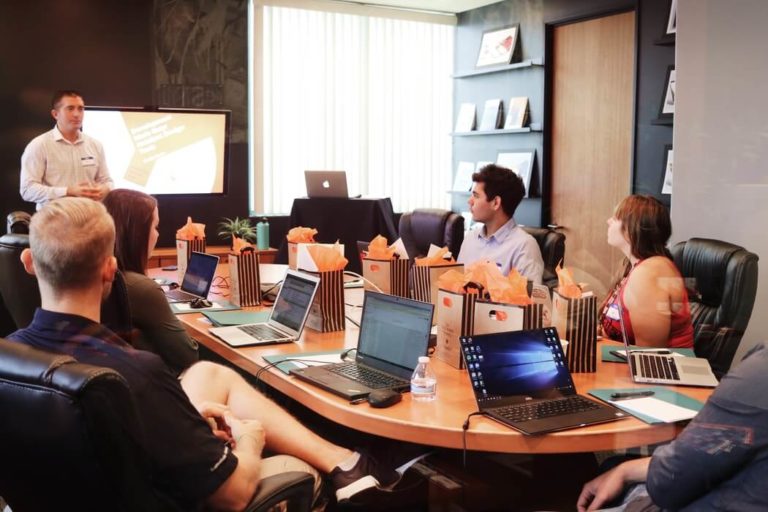How valued do you think Communication skills are at the workplace? Are you drafting your resume right now to land your next office? Then you must be wondering how much importance it actually deserves. And more importantly, how to draft the communication skills resume-section for landing your dream job.
Before advancing this conversation, allow us to clear your doubts first. So check out the most in-demand soft skill, according to a 2016 LinkedIn survey. Evidently, communication skills are the most sought-after skills by employers today. So now that you have clarity over how important it is, let’s jump to the next part. What communication skills are good for your resume? And how to develop them?
Table of Contents
What are Communication Skills?
The answer to what Communication Skills are is simple. For expressing ourselves, we send out signals and information. And for understanding others, we take in and process such signals and information. Thus, creating some level of understanding through such exchanges is what we call Communication.

Engaging in such exchanges casually is one thing. But if you want Communication to bring some sort of output or benefit, it takes expertise and skills. Altogether, we know such expertise and skills as ‘Communication Skills’.
In theory, it sounds simple. But applying Communication skills at the workplace takes more than that. Because such skills can make or break enterprises. Moreover, there are some communication skills that employers value relatively more. And in general, very high numbers of people don’t have such skills.
Hence, such abilities are definitely worth working at and mentioning in your communication skills resume section. And how to do it the right way? Here we are with a step-by-step guideline to do that. There are many easy resume templates available online, which can help you get started on drafting a standard resume for yourself.
How Many Types of Communication Skills are there?
In fact, there are many types.
But for the sake of better understanding, we categorise them into three broad groups:
1. Verbal Communication
2. Non-Verbal Communication
3. Written Communication

And there is another one that some experts count as a distinct category. However, it is disputed. And that category is ‘Listening’. Because of how critical listening is to Effective Communication, it is so talked about in general.
Verbal Communication Skills
As the name suggests, this category of Communication skills involves speaking. So, the skills that we apply in spoken communication, are called Verbal Communication Skills.

Verbal Communication can be formal and informal. But for acing both types of verbal communication, you need to apply Contextual Intelligence.
Other general aspects that are needed to make effective verbal communication skills are as follows:
- Choice of words
- Structure of sentence
- Style of Expression
- Application of voice (Intonation)-
To elaborate, this includes the pitch, tone, and cadence (or prosody) that you apply. They determine how your voice sounds while speaking. - The non-verbal aspects
Non- Verbal Communication Skills
Verbal and non-verbal aspects of communication are like the two sides of the same coin. In other words, one doesn’t exist without the other. At this point, you might be used to making all your professional communication online. But your non-verbal communication is inseparable from the verbal aspects anyway.

Whether someone is there to witness it or not is another question. But for getting good at Communication, combining both sets of skills is crucial.
The critical aspects of non-verbal communication are:
- Facial expressions
- Touch
- Posture
- Movements of your hands
- Eye movement and eye contact
While mastering the non-verbal aspects, focusing on two things will help you. Firstly, understand how others receive your non-verbal cues. And secondly, learn to read the non-verbal cues that others show.
To illustrate how important non-verbal communication is, let us paint this picture for you. You might be trying to convince a client to buy your idea. And your client might be initially agreeing to your ideas verbally while feeling not too convinced within. But your non-verbal communication skill enables you to read his doubts. Then instantly, you can do something more convincing to sell your idea to your client.
Do you want to learn more non-verbal skills? Then learning what the different types of non-verbal communication skills are can be a good start.
Written-Communication skills
All the mentioned categories of Communication Skills are instrumental to your professional success. But if there is one that employers actively mention and seek out, it’s the written communication skills. And there are solid reasons behind why they do this.

You will be applying your written communication skills more than the others that are directly job-related. And the quality of the communications you make might often make big differences. For example, it can determine whether your clients accept your offers. Or, it can ensure that your emails are making donors interested enough in issuing funds.
To paint the opposite picture, consider this. You receive an email that doesn’t sound too polite. Maybe bits of spelling mistakes and grammatical errors are scattered here and there. After that, the Email ends with inviting you for subscribing to their service. Will you be interested? It’s doubtful that you will be. The same will happen unless you achieve excellence in your writing skills.
A resume writing service can help you demonstrate the best writing skills to boost your credentials. Resume writers are skilled in presenting information clearly, concisely, and visually appealingly, effectively highlighting your strengths and accomplishments.
Many employers run applicant tracking systems (ATS) for resume-screening. Resume writers are familiar with ATS and can optimize your resume with relevant keywords, increasing the chances of passing through these systems.
When choosing a resume writing service, it’s essential to research and select a reputable provider with positive reviews. Additionally, be sure to communicate clearly about your career goals, achievements, and any specific preferences you have for your resume.
The quality that top-quality writing demands is an elaborate topic of discussion itself. But for keeping it simple, here are two notes that will come in handy.
1. Write about things that you believe in.
Confidence in your abilities and alignment with your beliefs can make your accomplishments and contributions more convincing to potential employers. If you are genuinely enthusiastic about certain projects, causes, or achievements, it will come through in your writing and potentially make a stronger impact on the reader. You communicate a sense of purpose and coherence in your career by including elements that align with your personal effectiveness and professional values.
2. Good writing means repeated reading, ruthless editing, and rigorous quality control.
Ensuring that your writing adheres to language conventions is crucial for conveying professionalism. Reading your writing multiple times allows you to assess the content’s flow and coherence. You can identify awkward phrasing, ambiguous sentences, or areas where additional explanation is necessary.
Effective Communication Skills To Mention In Your Resume:
Some Communication Skills will be directly mentionable in your resume. And some will be passively good for your resume. Here is a list of the skills that you can directly flaunt in your resume:
1. Language Proficiency
Language Proficiency should be the Communication skill to top this list, hands down. Languages are like vehicles for our words. Riding them, our words can take us places. So investing in your language skills will help you reach as far as you stretch your vision.
How To Mention Language Proficiency In Your Communication Skills Resume-Section?
For mentioning language proficiency in your Communication skills resume column, we have this one key tip for you-
Highlight only the language skills that will likely benefit your employer. (In contrast, many people mention unrelated skills that they are barely amateurs at. So avoid such practices.)
2. Slide Presentation
Did you ever get bored with running your eyes through too much text? If you didn’t, then you are not like most people. That is because humans naturally have a high affinity towards visual experiences.

So, it is only expected that offices and workplaces today are so dependent on slides. Here is a white paper that was published by IDC and commissioned by Microsoft Corp. According to this- “Communication, integration and presentation skills (CIPs) are required for about 40% of all positions and make up 11 of the top 20 skills that are required by 39% of the fastest growing, highest paying positions.”
This is one of the skills that are valued irrespective of field. So, your Communication Skills resume-section should directly mention your Slide Presentation skills.
3. Public Speaking Skills
Public speaking can be a fiercely powerful communication skill. At one go, you get to influence a room full of audience.
Therefore, being strong at it can make you a gem to your employer. Because having great public-speaking abilities ultimately means having the power to influence more people. And the more people you can convince for your employer, the more value you bring.
Here are some brief tips for you to focus on:
- Know what you are speaking about. In other words- outline your speech first.
- Know your Audience.
- Nervousness is a common phenomenon. But remembering one thing should help you when you feel shaky. Your audience wants you to win. Though, we often assume the opposite while getting up on that stage. The truth is, they are investing their time and attention to listen to you.
- Strong visual materials are a highly valuable addition to public speaking.
How To Mention Public Speaking Skills In Your Communication Skills Resume-Section?
Try outlining the numbers of the events and training that you have covered. If you can reflect the value that your public speaking brought in the form of numbers, even better. Example:
– Trained over 300 students over 5 Workshops on ‘Effective resume writing’ successfully.
How to speak so that people want to listen
4. Phone Skills
Most of your professional relationships will be formed over phone calls. Having the right professional qualities in your phone conversations is a non-negotiable skill in a sense.

Here are the things to remember for doing it right:
- Before you make a call to an important contact, do your homework to know the person.
- If you are on the receiving end, taking your call at three rings makes a good impression.
- Are you calling for explaining or selling something? Then create and edit your script first. Over-randomisation and improvisation can be risky.
- Before leaving the call, make sure to ask the other person(s) if they want to say or ask something.
- Keeping the caller on hold for long can be very annoying for them. So avoid doing so at any cost.
5. Web Communication Skills
The web is the present and the future of the workplace. And the communication skills associated with it also come in an extensive range. But some essential web communication skills certainly deserve more attention.

Here are the top picks by One Education for you:
- Learn the differences between Synchronous and Asynchronous Communications and the related courtesies accordingly.
- Remember that your Digital Footprints will stay. So, anything that you write online should reflect a courteous persona. (Unless you know what you are doing otherwise). In other words, that means thanking your audience and acknowledging others.
- Refrain from engaging in anything close to cyber-bullying and trolling.
- For online meetings, maintain punctuality. And in case you need to present and share the screen, keep them ready beforehand.
6. Negotiation Skills
Negotiation skills can be actively talked about in your communication skills resume column. After all, this is a skill that can directly benefit your employer’s company.

Negotiation is the art and practice of meeting the other part halfway. The more it benefits both the parties, the better is the act of Negotiation. Here’s our shortlist of the steps to practice better negotiation:
- Study the related market/ context to know what could satisfy the other party.
- Make your list of clear goals. These are the things you want to ensure after the act of Negotiation.
- Learn about the theory of BATNA (Best Alternative To a Negotiated Agreement). And before entering the conversation, make sure that you know your BATNA.
- Stay conscious not to let a Negotiating discussion turn into a dispute.
7. Skills for Sales/ Persuasion
Henry Ford was on point when he said- “Nothing happens until someone sells something.”
Almost any story in the world has something to do with selling. Be it an idea, a product, a service, or anything else. So, if you can demonstrate expertise in this area, there is no looking back.

For excelling at sales, learning strategies around Aristotle’s famous theory on persuasion can be helpful. This theory states that there are three modes of persuading others:
- The first one is Ethos. In this mode, you are supposed to showcase your credibility, reliability, and authority. Out of their trust in your credentials, your target audience will allow you to influence them.
- The second mode is Pathos. In this mode, you tap into the audiences’ feelings and emotions. Accordingly, you strategise how to promote your idea.
- The third mode is Logos. This mode is all about logic and reasons. By presenting numbers, facts, and data, you can convince your target audience to pay attention.
Explore different strategies to master all these three modes of persuasion. Over time, it will lead to mastery over this invaluable skill.
How To Mention Sales Skills In Your Communication Skills Resume-Section?
For making your resume stand out with Sales skills, mention numbers and records. For example-
Acquired 22 new customers each month on average.
Or, contributed to 17% increase in revenue.
And if you are specifically applying for a sales job, make a separate ‘Sales’ section. Next, mention the related skills, experiences, and training that you have earned.
8. Conflict Resolution and Mediation
A successful business is about sustaining successful relationships with many stakeholders. So, unwanted conflicts can be really frustrating and even destructive to your business.

While mastering and exercising Mediation, keeping a few goals in sight will give you clarity. Here they are:
- Aim at resolving conflicts at the fastest possible pace.
- If you are in a position of mediating, being fair towards both parties is a priority. Otherwise, your role as a mediator is obsolete by definition.
- Improving relationships is the ultimate goal here. However, sometimes things can go in the opposite direction despite that. So learn when to dissociate.
Pro-tip: Grab some basic knowledge of the three types of Conflict Resolution. They are- Mediation, Arbitration, and Litigation.
9. Social Media Communication Skills
You must be aware that even SME-s these days hire social media managers. And when it comes to corporates, they frequently employ full-fledged Social media executives.
And why is that?
Because if your employer wants to know and stay connected with his customers, which he does, he needs social media. However, not everyone is adept at amassing a large social media audience. So, if you have the knack for nailing social media communication, that’s a very strong point. So, go ahead and flaunt it in your communication skills resume-section without getting shy at all!
But are you wondering if you need to learn more before taking that step? Then have a look at this course ‘Marketing Communication’ by One Education.
10. Data Visualisation
Remember how we just talked about the three aspects of persuasion- Ethos, Pathos, and Logos? You can hack the ‘logos’ part of it using your Data Visualisation skills.
Are you willing to convince a client or an investor of an idea or story? Today’s world is floating on an ocean of data. So, doing it without the data in hand might come across as looking poor.

Now, what is the key to doing Data Visualisation right? The mantra is to make your graphs and stats tell a coherent story. Just cramming your slides with gaping numbers doesn’t do the job. But, does your data visualisation help your audience paint the story that you told in their head? If yes, then it’s a success.
But it’s more complicated than it sounds. Today, data science, big data, and machine learning are in the trend for a reason. Because mining relevant data and doing predictive analysis- are extremely valuable skills today. So, going so in-depth might not be feasible for you initially. But gaining skills related to this just might be that one step needed towards better employability.
And for getting started with rather low-key steps, try investing in visualisation skills. When you can present basic information in the form of visuals, they come across as much more convincing stories.
11. Brand Communications
Brand communication is the art and practice of creating your brand’s image in your audience’s minds. The job is both technical and creative. And doing this job also means competing with other brands in the market. Hence, adopting styles that set your brand apart is essential. For example, blending traditional and contemporary media can be your niched strategy.
The better you are at Brand Communications, the richer will be your PR Portfolio. The simple goal here is to keep your brand messaging as unambiguous and straightforward as you possibly can.
12. Strong Command Over Written Language
It might or might not surprise you. But when we stumbled upon this statistic, it took us away with surprise. Did you know that 73% of employers want employees with strong writing skills?

Mastering writing is something that many people dedicate whole their whole life to. So probably the best we can do is, helping you with our selected list of writing qualities. Apart from your own dedicated effort, keeping these points in mind should work as good writing techniques.
- Good writing is reader-oriented. Keeping the reader’s experience in mind always results in better writing.
- Good writing serves a definitive purpose. So before you start writing, know what you would like to accomplish through it.
- Quality writing is clear and non-ambiguous. Unless it’s high-end literature, running in circles almost never serves a purpose.
- A standard piece of writing should be free from spelling and grammatical errors.
How To Mention Writing Skills In Your Communication Skills Resume-Section?
Are you adding writing skills to your communication skills resume-section specifically as a writing job? If yes, then make a separate heading for your writing skills. Next, mention the sub-skills related to your applied post underneath.
For example, if you are applying for the post of a magazine writer, under your ‘Writing skills’ section, add related abilities such as pitching, interviewing, transcribing, story-telling and feature-writing.
Or are you applying for a job that’s not directly writing-skill-dependent? In that case, you might want to keep it slightly generic. For example, mention your experience in research and academic writing under the general skills section.
Finally, if you can attach a credible certification to your writing skill, that could do wonders. In case you’re wondering where to look for one, check out this course ‘ATHE Level 3 Diploma in English and Communications for Business’. The detailed take on the subject matter in this course will take your writing skills to the next level. And this highly acclaimed certification will give your Communication skills resume column that exceptional uplift.
13. Email Writing
Email writing is possibly the trickster of this list. As in, we often tend to undermine the impact that a good Email can actually have. Moreover, much work can truly go into writing a good piece of email. And that is also something that we often underestimate.

Writing a successful Email is an art in itself. And that remains true despite how minimal the volume is. And honestly, the volume isn’t too menial either. This study testifies that the average business person will send 43 emails each day. As a matter of fact, large corporations hire dedicated email marketing executives today. To elaborate, their full-time job is to ensure effective marketing using E-mails. To do so, they design E-mails and automate the process using high-level expertise.
So, in brief, what are some basic qualities of a good email?
- They are on-point.
- The subject line makes the recipient want to open the mail.
- Good Emails reflect great courtesy and respect.
- Their copies have impeccable spelling and grammar.
- Good Email copies are not ambiguous.
- When sent with the intent of sale conversions, good Emails get them done.
Related:
1. How to Develop Leadership Skills in the Workplace?
2. How to Improve Your Communication Skills in English?
3. How Do People Develop Cross Cultural Communication Skills?
4. 5 Interpersonal Skills That Every Manager Needs
14. Report Writing
Imagine these two scenarios:
1. You are at a meeting with a potential investor. And you are trying to convince him of your company portfolio. This will finally determine whether he agrees to give you funds. But you are doing so only with the help of vague anecdotes. Moreover, there is no statistics or visual to support your claims.
2. You have met with a challenge at your work that is not new. But it’s a hard problem to crack. However, someone did solve this problem before once. But that person doesn’t work at your office anymore. And no one else is being able to hack it. Only if it were documented somewhere!- is the only thing that you can think of.

Do these scenarios sound appealing to you? Hopefully not. But there is a definitive answer to both these situations. And that is Report writing. So, if you can showcase convincing report writing skills, it will be a direct asset for your employer.
Reports work as the portfolios of companies. They are also key to hacking future problem-solving. Reports also throw light on previous success, mistakes, and future predictions. So, the better you get at report writing, the more your employer will depend on you in a way.
Therefore, do mention your report writing credentials in your Communication Skills Resume-section.
15. Proposal Writing
Do you know what the first step of creating professional relationships often will be? If you guessed Proposal Writing, then you are right. After all, writing proposals is often how you reach out to potential donors and important stakeholders.

Project proposals are documents where you try to suggest implementing a project. So outlining projects, their purposes, projected future returns, methods, etc., comprise these documents.
So, proposal writing skills in your communication skills resume-section can distinguish you. However, just mentioning so is not enough. What will eventually help is a portfolio of the documents that you have created before. They will give your communication skills resume-section a much stronger boost.
16. Public Relations Management
The best accomplishments always depend on excellent collaboration. And the tool to hack great collaboration and networking is a top-notch PR skill set.
A PR Executive needs to be highly strategic and creative in communication. Depending on her interventions, an organisation gets its exposure to the media. She also helps reach out to partner organisations, audiences and clients.

Hence, work at it and highlight your PR skills in your resume if relevant. Because doing so could give your communication skills resume-section the necessary gravity. A good PR executive is expected to be great at interpersonal skills, maintaining media image, building brand image, etc.
The Communication Skills That Are Important Beyond Resumes:
So far, we have discussed directly about your Communication skills resume section. As in, you can mention the aforementioned skills some way or other in your resume directly.

But there are some communication skills, which we don’t usually mention in our resumes. However, these skills can act as the binding glue in your professional life. Ultimately, they are the ones that lead to forming valuable professional relationships. Basically, possessing these qualities will make your work acquaintances value you and recommend you. And eventually, these networks and recommendations will enrich your CV.
Some such communication skills that are important beyond your communication skills resume-section, are as follows:
- Active Listening
- Objectivity
- Being Courteous
- Trustworthiness and Honesty
- Confidence
17. Active Listening
Many prominent personalities have put this in different ways. That is, the most critical aspect of Effective Communication is listening actively. And Active Listening refers to the practice of staying engaged and present while the other person talks. In other words, that means not interrupting, paying attention, and applying empathy.

Active Listening is certainly a lot harder than it sounds. But it is the mortar that binds human connections together. So investing in this skill is just a non-negotiable practice for anyone.
18. Objectivity
The opposite of being objective is being subjective. And being subjective means being someone who intervenes solely based on his personal opinions. But, being subjective at the workplace can make you come across as someone too opinionated. In other words, this might make your peers think that you make judgments based on your biases rather than good judgment.

So, adopting an objective personality is key to gaining workplace trust. Here are a few things that you can do to practise this:
1. Be aware of your own biases and prejudices. Next, filter them out actively in your workplace thoughts.
2. Exercise emotional detachment whenever applicable.
3. Think of the bigger picture and the greater good. That way, you can practise letting go of your personal thoughts and interests.
19. Being Courteous
Being courteous has never been out of style. And it never will be, period. So swearing to be a lifelong learner of this skill is essential.
Pro Tip: Sometimes, the worst politeness mistakes that we make are while indulging in humour. So be extra careful to be politically correct while trying to be funny. Being seen as an impolite person is a much higher price to pay than being seen as a reserved person.
20. Trustworthiness and Honesty
The importance of being honest and trustworthy doesn’t need much saying. But that’s not the only point here.

To explain, sometimes being too open can expose vulnerabilities. On the other hand, being too closed off can make people seem less trustworthy. So besides being fundamentally honest, finding the right balance between these two is an important communication skill.
21. Confidence
So, one last but pivotal communication skill to mention is Confidence. Adding this tool to your Communications arsenal can be the deciding factor for many things.

For example, when you are confident, people will have enhanced trust in you. And when they trust you more, they listen to you more. Moreover, a confident executive will do a better job at representing her employer and company. So, all in all, mastering this can simply unlock many doors for you.
Mastering confidence can be a tricky business. But a small yet highly effective mantra that has helped many people is ‘Fake it till you make it’. In other words, it’s the process of practising what confident people already do. For doing this, whether you are confident or not doesn’t matter much. But over time, these habits and actions ultimately reverse engineer themselves to contribute to your core confidence.
Some, such habits of confident people to mimic are as follows:
- Before saying something, being sure of it is necessary.
- Confident persons stand up and walk straight without slouching.
- Avoiding comparison with your peers and surroundings is another common habit.
- Be aware of the value that you create.
Parting Note
There is a great thing about working on your communication skills. And that is, they don’t apply just to your work life. Getting good at it also improves your relationships. So investing in these will do more than just filling out the communication skills resume-section.
And for your resume, you can go through resume writing techniques to learn more. In the end, we all are works in progress always. So keep up the zeal for work, and never stop learning!
Further resources
- Communication And Interpersonal Skills in Food And Beverage Service
- The Importance of Effective Communication in Healthcare
- Effective Communication Skills For Social Workers
- 20 Great Jobs to Consider if you have Good Communication Skills
-
Why is Communication Skills of Physicians Important for Patients' Satisfaction?
-
How to Improve Your Interpersonal Communication Skills
- How Do People Develop Cross Cultural Communication Skills?
- Marriage Advice: The 8 Communication Skills of Happy couple
- 10 Essential Communication Skills for Workplace
- 10 Best Assertive Communication Worksheets and Techniques







 October 01, 2023
October 01, 2023








